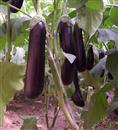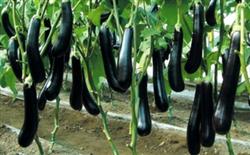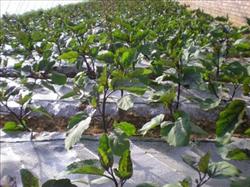It is necessary to achieve "three unsuitable" in planting eggplant.

Many vegetable farmers believe that the more the stubble, the more eggplant is harvested, the higher the benefit. But as a result, if there are too many stubbles, the benefit will be reduced. Because eggplant has a certain growth law, only by following this law can we have high benefits. The solution is to adopt the cultivation of overwintering stubble, one crop a year, and two crops a year in spring and autumn. Stay for a period of time every year in summer to drench the rain and reduce salt, sunburn and sterilize, kill insects in the shed, and mature the soil, so that the eggplant grows well and has high benefits. The amount of fertilizer should not be too much, the concentration of soil solution will be too high, the root system will die by reverse osmosis, and the yield will decrease naturally. Especially in the greenhouse, the temperature and humidity are high, the decomposition of organic fertilizer is fast, the availability of phosphorus is 2 or 3 times higher than that in the open field, and the amount of ammonia volatilization is large. Excessive fertilization is easy to cause fertilizer damage. The solution: in the greenhouse where Solanaceae crops have been planted for more than 3 years, the amount of organic fertilizer per mu should be controlled within 5000 kg, and the chemical fertilizer should be buried after application. In the plots with high salt concentration, more attention should be paid to the application of cow dung, humic acid fertilizer and EM bacterial fertilizer in order to increase the ratio of soil carbon to nitrogen, loosen the soil and reduce the damage of salt and fertilizer. At the same time, boron, zinc, magnesium and other trace elements are supplemented to balance soil nutrition. The temperature should not be too high. The upper limit of temperature for eggplant is 32 ℃. If the temperature is too high, the respiration will be enhanced, the physiological activity will be disordered, the fruit setting will be inhibited, the plant will grow excessively, the vegetative growth and reproductive growth will be out of balance, and the yield will decrease instead. The solution should be managed strictly according to the temperature needed in each growth stage of eggplant and the suitable temperature requirements of each organ in the growing period, and cool down in time in case of high temperature, so as to prevent the high temperature from growing branches without fruit.
- Prev

Common problems and control of eggplant in greenhouse in early spring
In early spring, various abnormal conditions often occur in eggplant in greenhouse due to low temperature and weak light. the common problems and control are introduced as follows: first, stiff seedlings in early spring often appear rigid seedling symptoms such as small leaves, dark green color, thin stems, few roots and so on.
- Next

Planting eggplant should be "three unsuitable".
Many vegetable farmers believe that the more the stubble, the more eggplant is harvested, the higher the benefit. But as a result, if there are too many stubbles, the benefit will be reduced. Because eggplant has a certain growth law, only by following this law can we have high benefits. The solution is to use overwintering stubble cultivation, one a year.
Related
- Where is it suitable to grow horseradish in China? it is expected to see the middle altitude horseradish in Alishan.
- How to prevent tomato virus disease reasonably? (Control methods included)
- Many people like to plant towel gourd on the balcony. What are the main points of this method and management?
- What crops can chili peppers be mixed with?
- Fertilization techniques and matters needing attention in Tomato
- What are the grafting techniques for peach seedlings in spring?
- Harm and control methods of root swelling disease of Chinese cabbage
- What are the pests of sweet potatoes? How to prevent and cure it?
- Symptoms, causes and Control methods of navel Rot in Tomato
- The cause of "Cucumber rotten bibcock" in Farmers' planting Cucumber and its Control Plan

